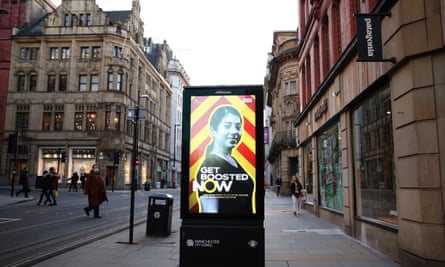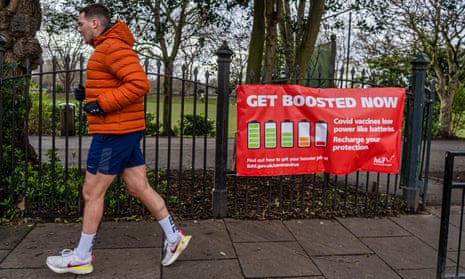The Covid booster campaign has stalled, and declining trust in the prime minister is part of the problem, say scientists.
Only 26,875 people in England had a third dose or booster on 1 February, the latest complete figures available, and 6 million people are at least six weeks overdue for their shot.
Behavioural scientists, including government advisers, and public health leaders say the huge drop in take-up in just one month is fuelled by the widespread belief that Boris Johnson flouted his own Covid rules.
Although Omicron is less deadly than previous variants, it remains a significant health risk to the estimated 5.1 million unvaccinated people aged over 12 in the UK, and the rolling seven-day average of deaths in Britain is above 240.
Double-jabbed people have a substantially lower risk of dying. But they remain more vulnerable to infection that can lead to long-term health problems and being taken to hospital, as well as death, in some cases.
The perception that Omicron is less dangerous is a major reason why only 64.6% of over-12s in England have had their booster, according to behavioural scientists. The winter surge in infections has also had an impact, since people have to wait 28 days after their infection has cleared before they can be boosted.
“Worry about infection has fallen to 52% of adults,” said John Drury, professor of social psychology at the University of Sussex, referring to ONS data published last week. “You can trace that to 27 January when the government announced that we didn’t need to have any measures. That communicates something about risk, that infection is OK because it’s not associated very strongly with death.”

UCL’s Covid Social Study, which has tracked attitudes to pandemic measures, released a report last week showing that unvaccinated and double-jabbed people were much less worried about catching Covid, becoming seriously ill, developing long Covid, or possible future variants. But they were more concerned than triple-jabbed people about being asked to get more vaccinations.
“In addition, most people who aren’t vaccinated have chosen not to because of a lack of trust,” Drury said. “And who has trust in this government now?”
Research by Dr Simon Williams, a behavioural scientist at Swansea University, showed that the partygate scandals had created “variant fatigue” with some participants in his December study saying they would ignore rules at Christmas because of the Downing Street parties.
“Trust in authorities has taken a battering recently,” he said. “One of the predictors of vaccine decisions is trust in authorities – we saw that in a big study in Denmark – and trust has certainly not got any better recently.”
He cited opinion polls showing declining trust, including a YouGov survey in December showing that one in 10 people would not follow Covid rules.
Prof Susan Michie, director of the UCL Centre for Behaviour Change and part of the SPI-B group that advises the government’s Sage group, said: “We know vaccine hesitancy is often associated with not trusting authority. The ‘get boosted’ message was heralded by the prime minister and recent events have meant that trust in politicians has decreased, undermining the ‘get boosted’ message.”
The NHS has been attempting to reverse the decline in booster uptake by reminding people to come forward. It sent texts to 2.4 million people last week and has opened 1,000 walk-in “Grab a Jab” centres. It is also working with employers to vaccinate people in workplaces.
Dr Emily Lawson, head of the NHS England vaccination programme, said new ONS research showed the risk of death involving Covid was 93% lower for people who had had a booster or third dose of vaccine compared with unvaccinated people.
She said: “It is vital that as soon as you can get the vaccine you take up the offer and book a guaranteed slot online.
“Despite the Omicron variant seeming milder, it is important we don’t lose sight of the fact that Covid is still a very serious illness that is affecting thousands of people’s lives every day.”
Dr Doug Brown, the chief executive of the British Society for Immunology, said: “Three doses of the vaccine doesn’t completely stop transmission but the rate of transmission is halved between people.”
Immuno-compromised people, such as cancer and kidney patients, did not respond as well to vaccines as those with healthy immune systems, he added. “By getting your booster, that reduction in transmission really does play an important role in not just keeping ourselves safe, but those who are more clinically vulnerable as well.
Prof Maggie Rae, president of the Faculty of Public Health, said: “I know people are tired. I know the government wants to move on. But we will only be able to get through this with people getting the vaccine. We need to establish who hasn’t been vaccinated, and how we help them.”
National Immunisation Management System data shows that by 11 January, 78.7% of people over 18 in the richest areas had had a third dose, compared with 46.9% in the most deprived. ONS data shows that 35.9% of pupils eligible for free school meals have received a first dose, compared with 58.9% for those not eligible. “It’s heartbreaking to see the discrimination and the health inequalities between the poorest in our country,” Rae said.
She said that ministers must continue to fund the vaccination programme. “I think the Treasury is trying to recoup the money that it spent during the pandemic and they want the Covid response money back. I think it’s right and proper that some of the private sector spending on test and trace does go back, because I’m not convinced all of it was spent effectively. But what I don’t want is further cuts to the public health system.
“The booster campaign was introduced at the last minute. Throughout this pandemic, they have been three weeks behind every sensible action or decision – the first lockdown was a classic example. The virus has outrun them the whole time.
“We need to keep up momentum because we’ve still got another few months of winter to go with all the vulnerabilities that brings. I’m not comfortable that 350 people a day are dying in our country. I think that’s shocking – absolutely shocking.
